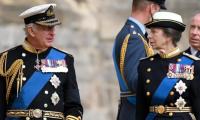Islamabad diary
It’s not the same as before; the zing has gone out of it. In Fata the operation is becoming a stalemate. Terrorist forces have been hit, badly hit, but they aren’t defeated. And their ability to mount maverick attacks such as the most recent in Charsadda is not to be ignored.
And the religious worldview, or rather the extremist worldview which is the ideological basis for the assault on the Pakistani state, is still there. Pakistan hasn’t become a more secular or ‘liberal’ place as a result of our war against terrorism.
To be sure, our soldiers and officers, mostly young officers, have proved themselves in this war, rendering great sacrifices against a tough and cruel enemy. Unfortunately, their sacrifices have not been matched by any corresponding change in the behaviour and attitudes of the rest of Pakistan. Our avowal of being in ‘a state of war’ remains a cosmetic declaration, without fire and spirit in it. For we remain for the most part as we were. Bribery in all walks of life, corruption, the state of justice, governmental efficiency, the mess on our roads, anything you can think of, it’s still all the same.
Only the fighting soldier has changed. This bears repeating. This is a new breed born of this unrelenting war. Even the mind of the young officer has changed. His eye is on the enemy and not real estate or the property business, which had become the leading pastime of senior echelons, and even mid-ranking officers, before the Taliban forced the Pakistan Army to return to its primary function of war and its related responsibilities. And the eye of the young officer is on the need to change Pakistan and the way it is run and its affairs are managed.
This is dangerous because such thinking should be the preserve of the political class and the educated citizenry. Soldiers have no business dreaming of politics. Bonapartism is not the seizing of power. Bonapartism is the thinking of dangerous thoughts. But in a republic whose institutions are weak and not fully developed, and where leaders are weak and self-serving – out to line their pockets all the time – and where the army is the dominant institution, as the Khalsa army was in the kingdom of Maharaja Ranjit Singh, those whose business is not to think dangerous thoughts start toying with dangerous ideas.
Especially when their own sacrifices contrasted with political greed and hypocrisy, and the windy nature of political oratory, fills them with contempt for the political class.
Because Zarb-e-Azb has been a pure military operation with no effort on the political front to initiate the socio-economic restructuring needed to make Pakistan a more efficient and forward-looking country, it has reached a plateau. What had to be done has been done. The enemy has been dislodged from his earlier positions but he survives…licking his wounds and planning his fresh moves. And the Pakistani state is where it was with all its accumulated inefficiencies – and corruption and commission-taking in high places and low still continuing as if Pakistan had never been in a state of war.
In Karachi something else is happening. The army command is getting bogged down in a side-battle, involving the PPP and Dr Asim Hussain. Would Asim Hussain have ever imagined, even in his wildest moments, that he would become the central character in such a drama? In pursuing this side-battle the Rangers, who are conducting the Karachi operation, are losing the plot.
Terrorism and the stranglehold of violence were the issues in Karachi, not corruption. Let’s concede for the sake of argument that Karachi was the most corrupt place on earth. Yet the source of Karachi’s violence was not corruption or the mis-governance of a corrupt administration. The source of that violence was ethnic-based politics and the dominance, stretching back over the past 30 years, of a particular Karachi-centric political party.
The Rangers started from the correct starting point. They went to the heart of Karachi’s problems but just when they had turned the corner, and the Karachi situation had dramatically improved, instead of concentrating on that front and bringing it to a conclusion, they opened a second front against the PPP.
Now the PPP may be all things, it may be the last word in corruption and mis-governance, guilty of every sin in the calendar, but not even its enemies can accuse it of having a soft corner for terrorism – whether the secular brand of terrorism which was the MQM’s forte or the Islamic revivalist brand of terror practised by the TTP and its many acolytes. In fact, despite all their other sins, the PPP and the ANP have been the greatest victims of terrorism. Let us not forget this.
Asim Hussain may be no one’s idea of an angel. He may be guilty of a thousand things. That’s for the courts to decide. But a sponsor of terrorism? Come my masters, this strains the imagination. And he has been in custody for months and there is still no proper charge-sheet against him. Is the object Asim Hussain or is it someone else? The whole thing now reeks of vindictiveness, and if this is what it is, heaven alone knows what may be the cause of it.
No one will touch our old friend Maulana Aziz of Lal Masjid. His greatest apologist is the government itself. But the Rangers seem to have forgotten everything else about Karachi and have only Asim Hussain in their gun-sights. And now there is the added drama of Uzair Jan Baloch’s sudden appearance. They said he was caught while trying to sneak into Karachi. As far as I could make out he was dressed in ‘boski’ shalwar-kameez, well-laundered too, and didn’t look like much of a fugitive.
Everyone knows he was caught in Dubai sometime back and he’s only been brought in from the cold now. What for? If he has any beans to spill we can safely bet that the beans will neither be related to the MQM nor the TTP. It’s a safe guess they will be about the PPP…Asif Zardari and so on. This is further confirmation of the fact that the Karachi operation has gone off the rails. No longer about its primary target, it is now in hot pursuit of a secondary objective.
Corruption is an issue in Pakistan…a big one. But Zarb-e-Azb was never about corruption, although there is no shortage of people who would have liked it to be about that, as much about Punjab corruption as Sindh corruption.
Zarb-e-Azb was about the challenge of the TTP and it was about Karachi violence. The army was successful in Fata and the Rangers were successful in Karachi. The frontline units in Fata still have their eyes on the main enemy. There is no confusion about objective as far as they are concerned. But the Rangers in Karachi, driven by a false sense of vendetta or God knows what, have allowed themselves to be side-tracked. With bated breath the nation now awaits the confessions of Saint Uzair Jan of Lyari. The drama takes another turn, although, alas, what it most elicits now is a yawn and a weary shrug of the shoulders.
The army has won itself a reputation this last year and a half. Should it begin to compromise it so lightly?
Email: bhagwal63@gmail.com
On April 2, India tabled bill in Lok Sabha, proposing sweeping changes to management of Waqf properties
Trump had even imposed tariffs on uninhabited Heard and McDonald Islands near Antarctica
Some would say this is the call of fate when time comes back to haunt and when blushes are visible
Actions of ICE are sweeping and have targeted not only int'l students holding visas but also green card holders
According to Trump, US is earning $2 billion per day in newly-introduced trade tariffs
Negligible contribution of e-commerce underscores persistent reluctance towards digital adoption







